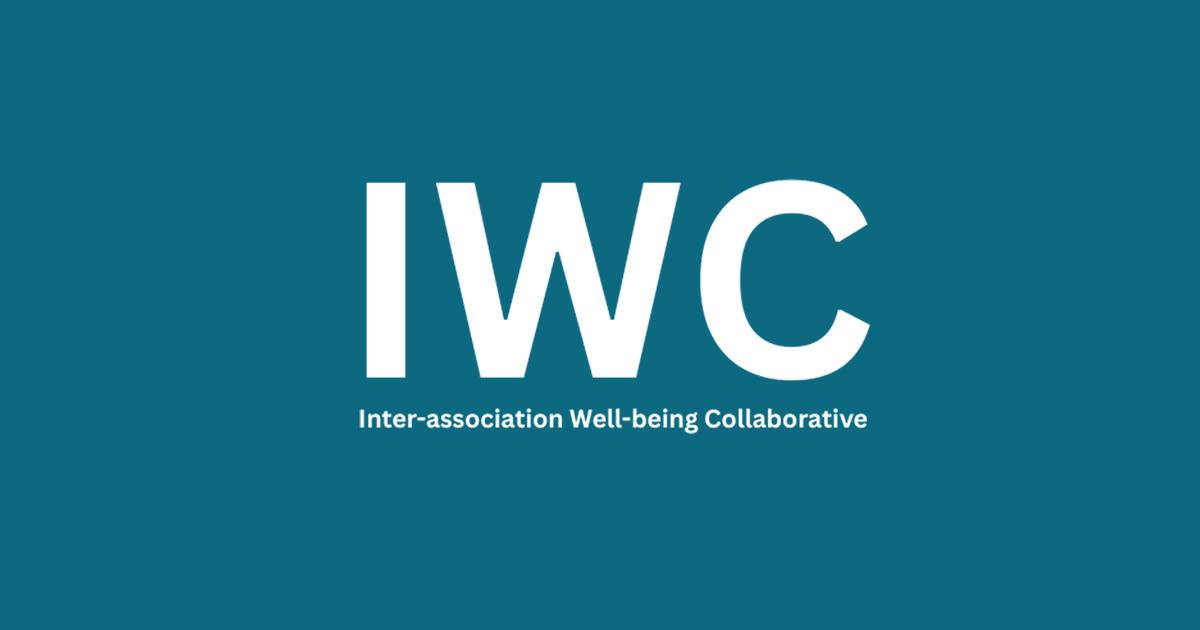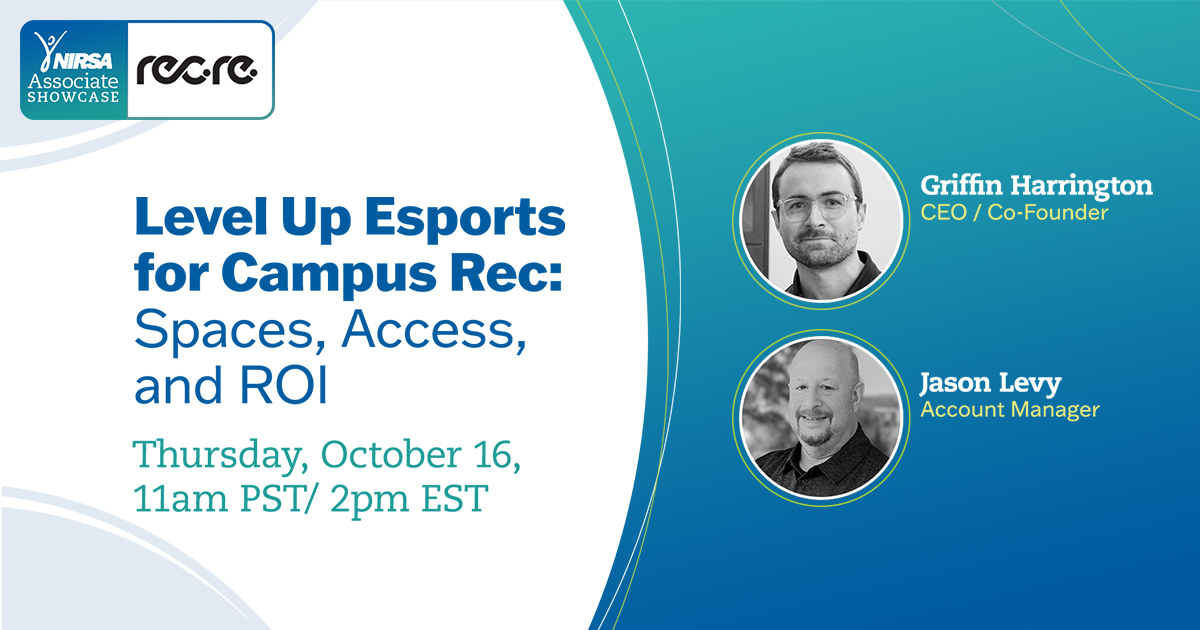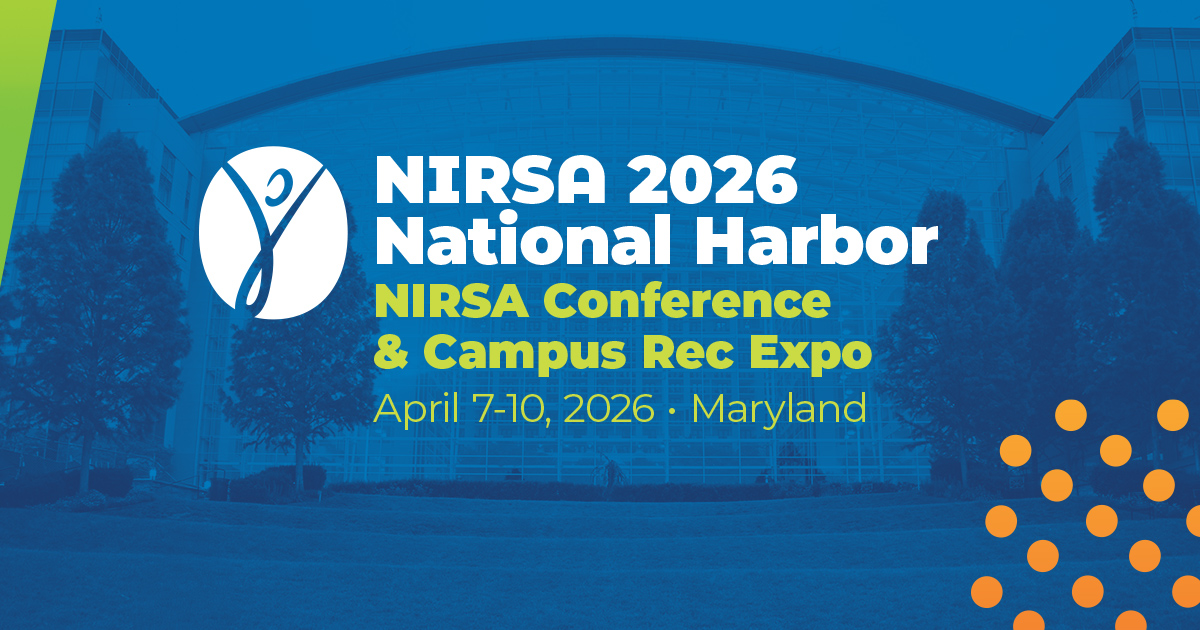With more than 100 sessions to choose from, it’s impossible to attend everything at the NIRSA Annual Conference that might benefit your career. We hope to use this series to preview some of the innovative sessions from the upcoming 2020 NIRSA Annual Conference in Phoenix.
This week we caught up with lead presenter Chris Morris, Director of Campus Recreation at Florida State University, and co-presenters Michael Edwards, Senior Director of Campus Recreation at the Georgia Institute of Technology, Tim Mertz, Senior Director, Collegiate & Community Recreation at HealthFitness, Mila Padgett, Director of Campus Recreation & Wellness at the University of South Carolina Aiken, and Jennifer Speer, Senior Director of Communications, Development, and Memberships at the University of Texas to find out a little bit more about their presentation “Dolla Dolla Bills, Y’all: A Discussion on Innovation and Financial Sustainability,” which will explore an organization’s capacity to add new programs or opportunities that might result in a positive fiscal impact.
Session attendees will have an opportunity to learn about how to best balance offering “free with a student fee” programs and services with new and innovative programs that may include an additional charge. Take a few minutes today to discover why financial sustainability and wellbeing is so important to campus recreation professionals and get good tips on where you can go to learn more about the topic.
The importance of financial sustainability for campus rec
Q: From your perspective, why is financial sustainability such an important topic for campus recreation professionals?
A: The financial landscape within higher education is changing, and as state appropriations and institutional support diminish, administrators look to campus recreation to augment the business and operational strategies as a way to enhance the revenue generating capabilities that campus recreation facilities, fields, equipment, access and programs can produce. The business of campus recreation is becoming more sophisticated, and as such, business acumen, entrepreneurialism, technological solutions and systems that support transactional services are all quickly becoming the norm.
Financial sustainability is defined as the ability to start, grow, and maintain your business with short and long-term stability. Financial sustainability is possibly the single-most-important topic a recreation director has today. Higher education is under scrutiny for the continued rise in costs (25% over the past 10 years). Federal, state, and local governments are looking closely at all funding. They are looking at rising tuition and fees more than at any other time.
Campus recreation departments across North America have been challenged to find new ways to fund and deliver the great programs and services we provide our campus community. The challenges will continue to be more difficult. To find financial sustainability, we must search for and find new ways to fund and to deliver our programs and services.
As state and fee-allocated resources continue to become more and more limited, having the ability to be financially self-sustaining continues to be an important goal. Creating financial flexibility allows for greater freedom to be nimble and innovate quickly. The challenge is to balance easy access participation opportunities—those opportunities that are free or “free with the fee”—with more advanced opportunities that come with a revenue generating cost.
Because many of our departments function as auxiliary units on campus, we are often responsible for everything related to maintaining our facilities, programs, services, and personnel. It’s critical that we are strategic in how we budget and plan for our financial future.
A campus may be hit with mandated increases for university services (i.e. ITS and administrative fees) or annual self-funded merit pools; it may be in a position where it’s required to give back funds for university and divisional initiatives, which may ultimately lower the total amount of allocated tuition dollars a department is scheduled to receive; to meet these demands, campus recreation leaders have to become creative and entrepreneurial, looking at new revenue streams to maintain budgets, and be prepared to offset the givebacks and mandated increases.
Key ideas for NIRSA 2020 attendees
Q: What do you hope is the most important takeaway for attendees of your session?
A: Entrepreneurial thinking is the ability to see things differently than the rest of the world; but it is not necessarily an inherent trait and can be developed and improved. It is more like a state of mind that opens your eyes to new learning opportunities to grow your organization.
Innovation and financial sustainability require a multi-dimensional approach. No single program or facility can carry the financial load being placed on campus recreation. Campus recreation leaders must be able to assess all available revenue generating options available to them and intently strategize how to optimize each so that maximum financial returns can be achieved.
That there is no magic formula for pursuing financial sustainability for your department. But there are some fantastic ideas that fellow collegiate recreation professionals are willing to share. While very few ideas can be “cut and pasted” from one institution to another, with conversation, collaboration, and an open mind, best-practice ideas can be enhanced by tailoring them to fit your department and university’s needs. Learning from others will provide you with the financial flexibility and independence that you desire.
We hope session attendees leave with one or two ideas to explore on their campus that might assist with increasing their revenue or inspiring creative ways to be financially sustainable. The takeaways will hopefully be an understanding of different ways of thinking about how your department can move toward financial sustainability. Your takeaway may be at a fundamental business level, a business development level, sponsorship growth, and or partnership development, all of which are part of a solid, entrepreneurial approach.
Learn more
Q: Where would you direct a reader who wanted to learn more about this topic?
A: If your undergraduate or graduate degrees did not include any business, accounting, marketing, or statistical coursework, seek out certificate programs that will enhance your working knowledge of these topics. Regardless of your educational background, there are some outstanding digital resources available at little or no cost. Subscriptions like the Harvard Business Review will give you something useful to read each day. Aside from great business articles and insight, you’ll also find great resources on managing and leading a team. Fast Company is a good site for innovate ideas and concepts outside of higher education, but it’s easy to find applications and transferable takeaways.
Talk to NIRSA colleagues who are doing unique things to maintain or even grow their budgets. Stay apprised of industry trends through the Chronicle of Higher Education and get connected with entrepreneurs on your campus to understand the guidelines for getting into new areas (i.e. are you allowed to have sponsors? How do you get into alum fundraising?). Source a mentor and establish coaching sessions. Pursue opportunities to serve on boards or committees within industry associations where you will generally be granted access to different financials.
And, of course, come to our session at NIRSA 2020 in Phoenix! It’ll be happening Monday, April 20 from 2:30 pm-3:30 pm in Room 124 AB.
NIRSA would like to thank Chris, Mike, Tim, Mila, and Jen for taking some time to preview their upcoming presentation. Don’t miss your opportunity to discover innovative ideas you can take back to your institution when you spend four days in sunny Phoenix this April at inspiring educational sessions, interactive roundtables, and informative exhibits at the 2020 NIRSA Annual Conference & Campus Rec and Wellness Expo.
Presenter Bios
Chris Morris is currently Director of Campus Recreation at Florida State University. For the past 10 years at Florida State University, he has been responsible for a comprehensive recreation program that is the largest employer of students on campus and utilizes seven distinct recreational facilities to serve the wellbeing needs of the FSU community. In the field of collegiate recreation/higher education for more than 25 years, Chris also spent three years as Vice President of the Business Innovation Group within American Home Bank (now Bank of America) leading a partnership between Collegiate Financial Services and the National Association of Collegiate Directors of Athletics. Currently, he leads a master planning initiative for the FSU community’s long-term collegiate recreation needs and he provides Executive Committee leadership for FSU’s Healthy Campus 2030 initiatives.
Michael Edwards is currently the Senior Director of Campus Recreation at the Georgia Institute of Technology. Over his career, Michael has served in various capacities, given presentations and keynotes—nationally and internationally—on a wide range of topics relating to facility design, construction and operation, risk management, recreational programing, event management, and aquatics. In his most current position, he oversees the 300,000 sq. ft. Campus Recreation Complex, with a team of 23 professional staff, 400 student employees and 200 volunteers. In the area of development and fund raising, he has been instrumental in securing 11.5 million dollars in Recreational endowment funds for the department, to include Outdoor Recreation Programing, Aquatic programing and position establishment, recreation facility and general use.
Tim Mertz is currently the Senior Director, Collegiate & Community Recreation at HealthFitness. He holds dual responsibilities within the HealthFitness’ Account Management and Business Development teams. While regularly consulting, presenting, and developing strategy in the pursuit of new business, he also oversees a national book of collegiate and community recreation teams who successfully provide their campuses and communities with leading edge programs, facility, and staff management as well as modern operational and business strategies.
Mila Padgett is currently the Director of Campus Recreation & Wellness at the University of South Carolina Aiken. She has been in the field of collegiate recreation/higher education for over 25 years and worked within health and wellbeing arena for the majority of her career. Currently Mila is a co-researcher relating to women’s trajectory in collegiate recreation titled Passage through the Leadership Labyrinth: Women’s Journey in the Collegiate Recreation Profession.
Jennifer Speer is currently the Senior Director of Communications, Development, and Memberships at the University of Texas at Austin.
- For more information about NIRSA 2020, contact Director of Professional Development, Kristen Gleason .
- If you are interested in highlighting your campus or a NIRSA member’s achievements on your campus, pitch us your ideas.







